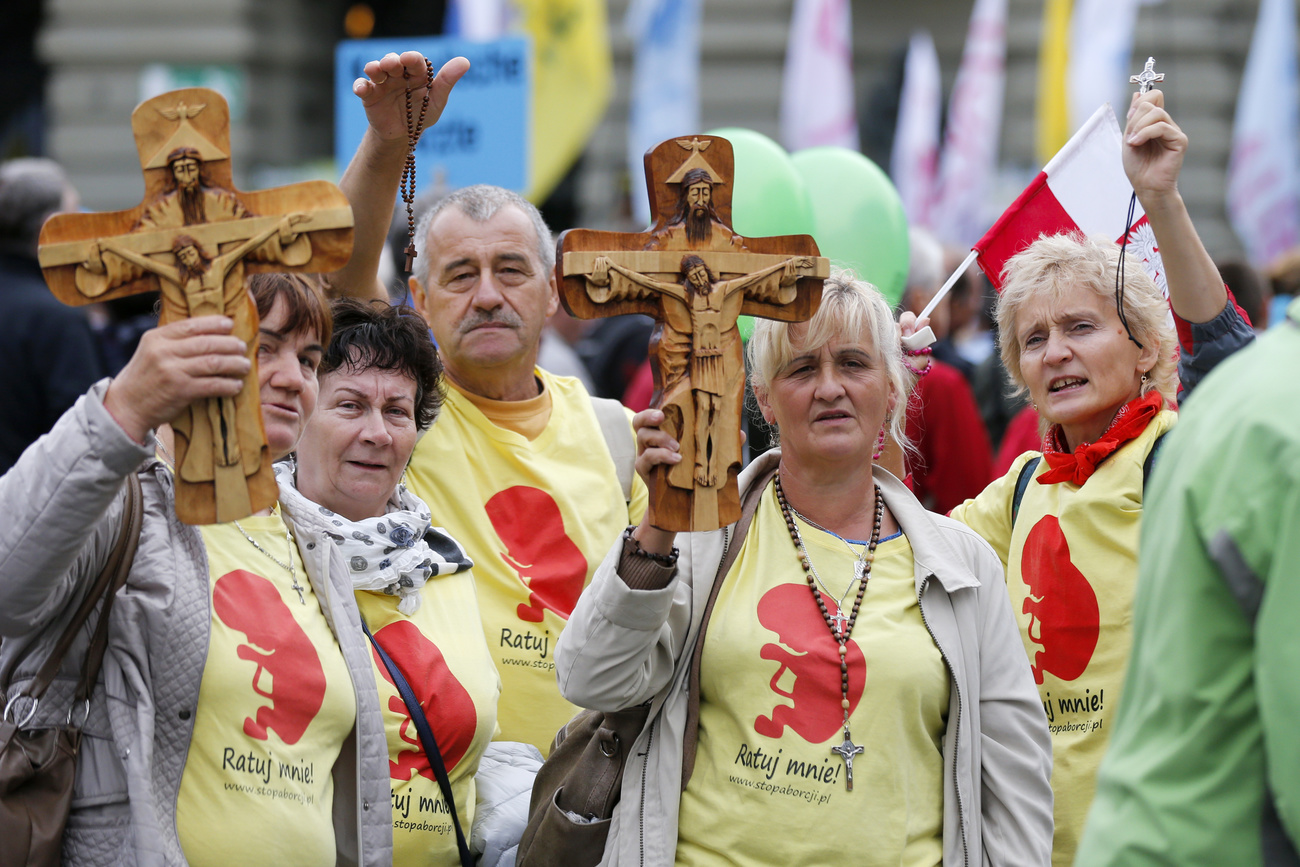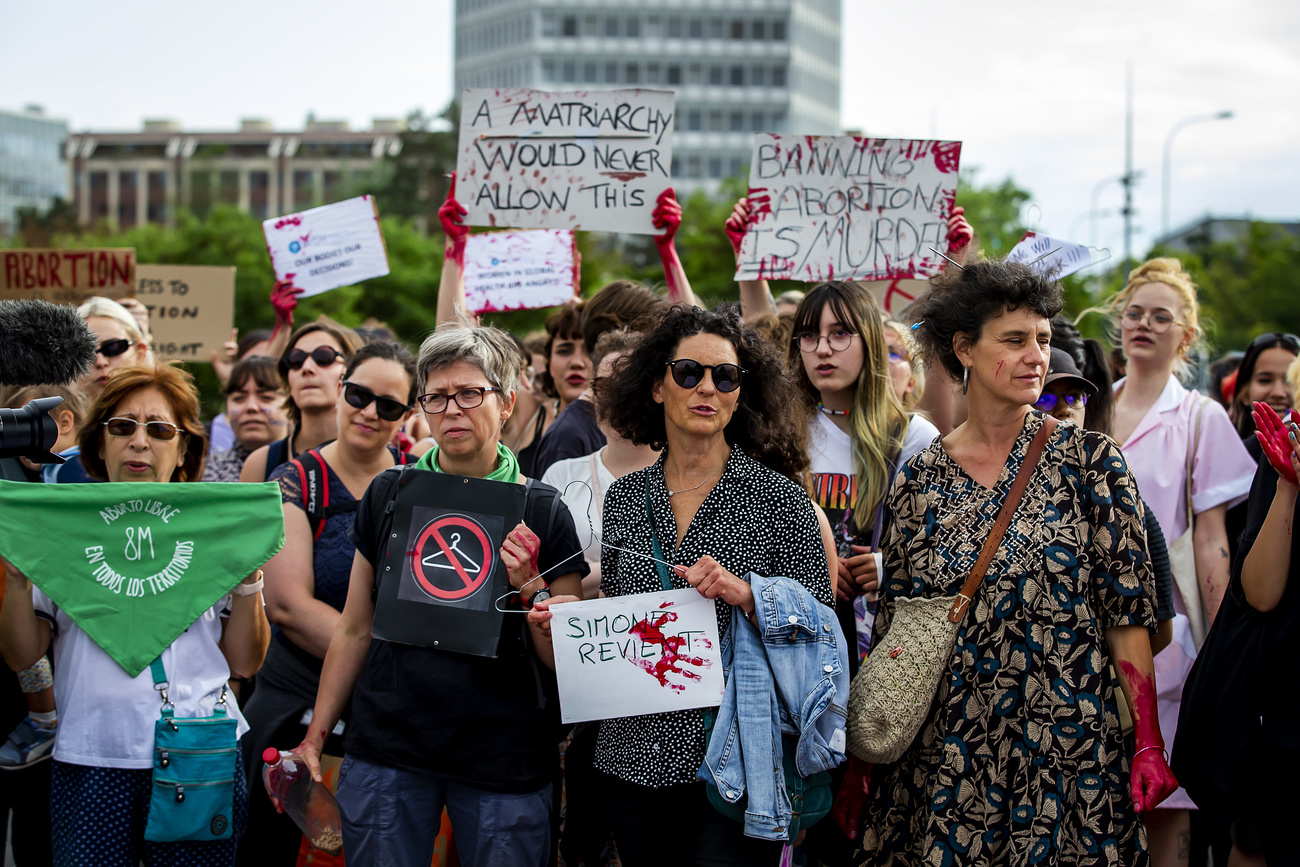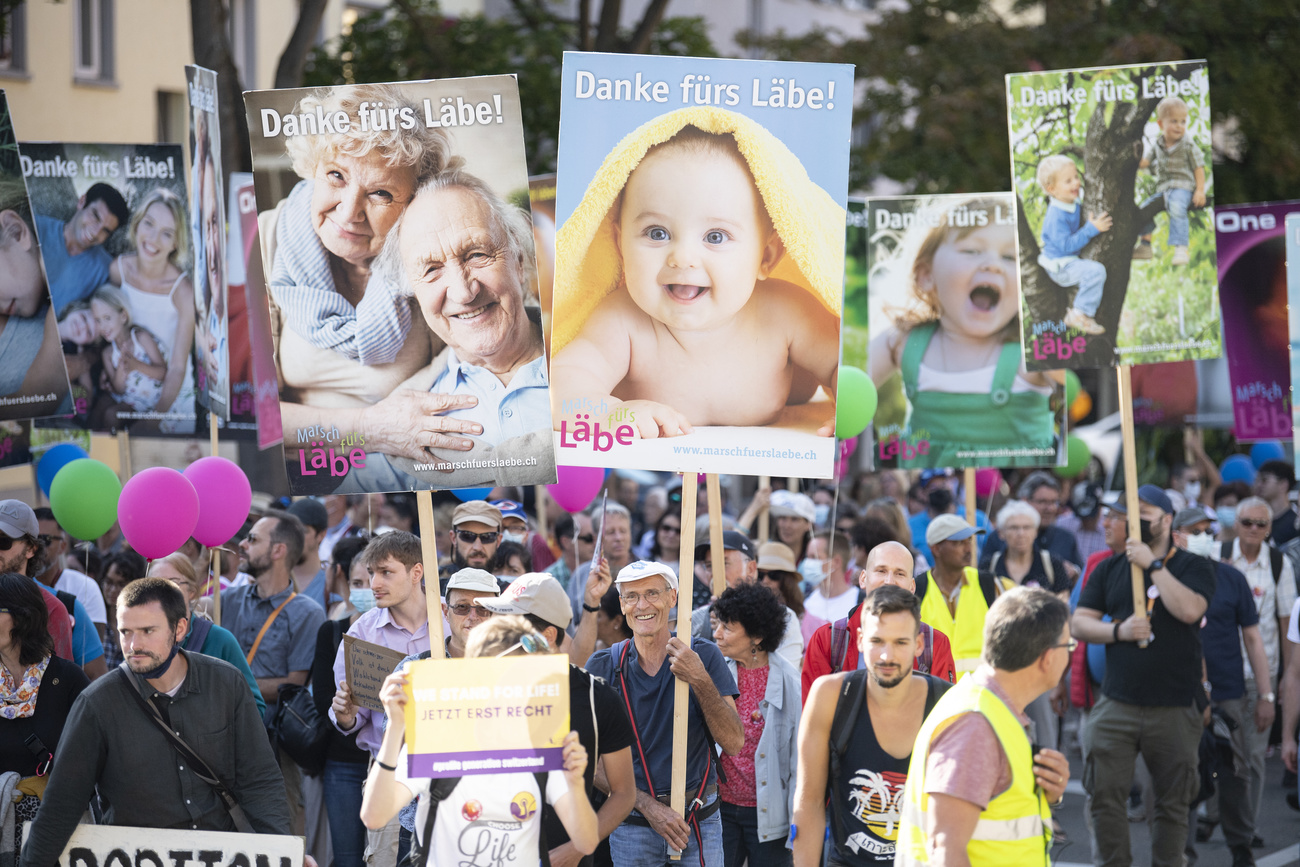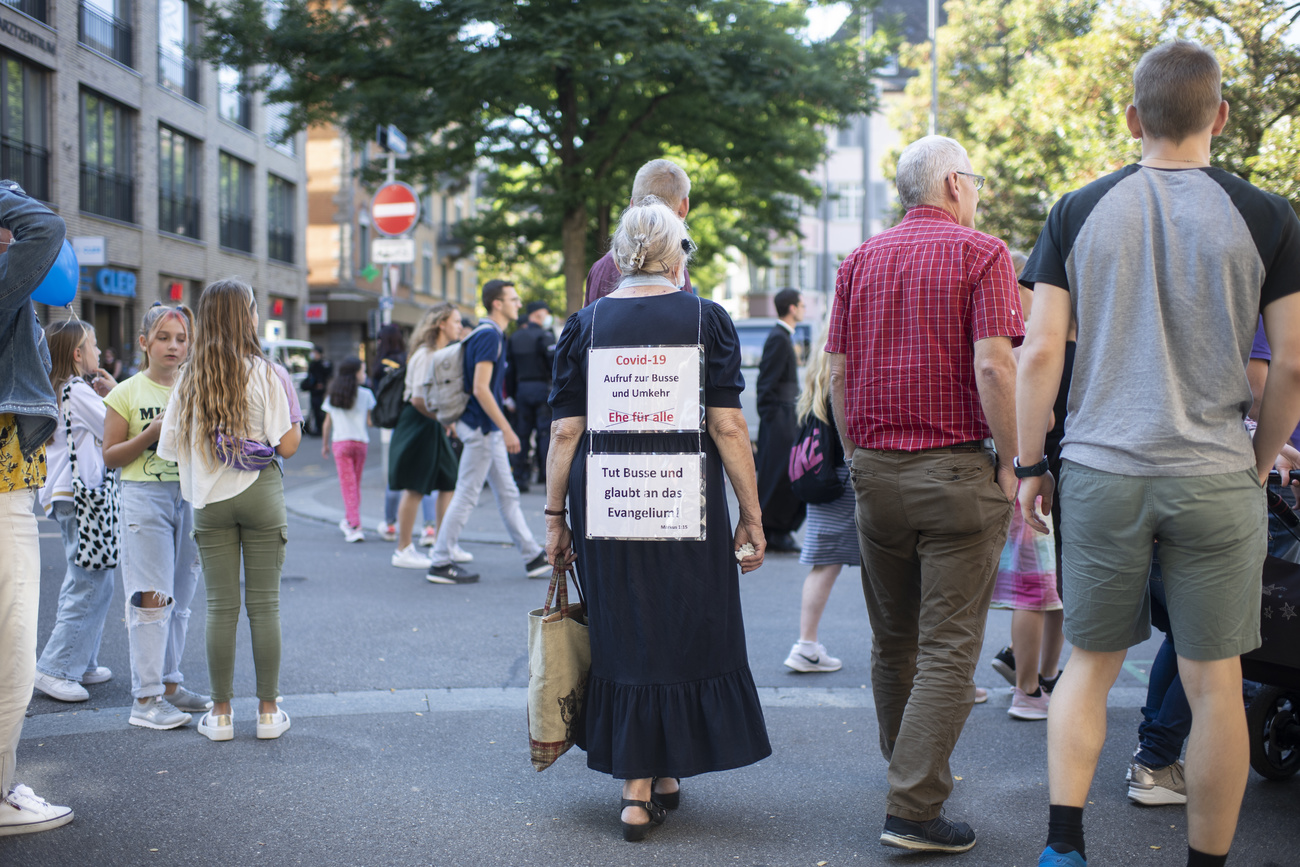
How Switzerland’s pro-life movement is gaining ground

Anti-abortion movements are thriving in Switzerland. From lobbying and setting up baby hatches to offering health insurance premium rebates, pro-life organisations are finding ingenious ways to restrict the right of women to terminate pregnancies.
“The pro-life movement has modernised and professionalised itself, and become more politicised,” says Neil Datta, executive director of the European Parliamentary Forum on Population and Development, an independent network of parliamentary groups in Europe that wants to strengthen sexual and reproductive rights.
For Datta, the development of the pro-life movement on the European continent is worrisome in the wake of the Supreme Court decision this past July to overturn the federal right to abortion in the United States.
“In the last decade, many attempts to curtail abortion rights have occurred, for example in Portugal, Spain, Lithuania, Slovakia, Poland, Austria, Finland and even Sweden,” he says.
Switzerland is not immune to this trend. Although just a small minority of Swiss openly reject abortion rights, groups that are opposed to voluntary terminations of pregnancy (VTP) have diversified their strategies to promote their ideals.

More
How abortion rights in Switzerland compare internationally
The lobby in parliament
On the political side it is the conservative right Swiss People’s Party that flies the anti-abortion flag. Parliamentarians from the country’s largest party regularly make interventions in the chambers or launch popular initiatives aimed at restricting abortion rights.
Until now, such proposals have been consistently rejected. But in December 2021 two women parliamentarians from the People’s Party launched a new pair of popular initiatives. They have until June 2023 to collect the 100’000 signatures needed to force a nationwide vote on the texts.
The first initiative, dubbed “Sleep on it”, was launched by Bernese representative Andrea Geissbühler. The proposal is to introduce a day of reflection before a scheduled abortion in order to “protect women from abortions decided in a hurry”. The second proposal, put forward by a parliamentarian from Lucerne, Yvette Estermann, wants to tackle “late abortions”. If accepted, this text would make any voluntary termination of pregnancy illegal as soon as “the fetus can breathe outside of the uterus, if necessary through intensive care”.

Although they insist their initiatives are not aimed at making abortion illegal, the two women are closely linked to pro-life organisations in Switzerland and go so far as to employ the same arguments. Geissbühler is on the board of the Swiss association Pro Life, which is openly anti-abortion. The parliamentarian believes a voluntary termination of pregnancy amounts to murder.
“If some lives can be saved through these initiatives, then they are worthwhile,” Geissbühler tells SWI swissinfo.ch.
The two conservative politicians may be acting as spokespersons for these initiatives, but they are not the authors of the texts. Behind the women are radical anti-abortion groups.
“These initiatives were written by different organisations, which then asked us to lead the initiative committees,” says Geissbühler.
Pro-life activists at home and abroad
Neither Estermann nor Geissbühler wants to reveal the names of these organisations. Nevertheless, the signatures collected in favour of the initiatives need to be sent directly to one of these groups, the association Mamma. Its president, Dominik Müggler, is fervently anti-abortion. A Basel resident who is on both initiative committees, Müggler opposed the decriminalisation of abortion in Switzerland back in 2002.
Müggler has set his goals far beyond these two initiatives.
“Sooner or later abortion will disappear,” he writes in a reply to SWI swissinfo.ch, “not because it will have been made illegal, but because humankind will have realised that such a practice is fundamentally opposed to human dignity.”
“Abortion is not a termination of pregnancy but the killing of one’s own child,” it says on the Mamma website.External link
As an activist Müggler takes part in anti-abortion conventions and demonstrations abroad, events from which he draws inspiration. He is pictured, for example, at a “march for life” – an anti-abortion protest that exists in several countries – in Washington, DC in 2019. He was also behind the creation of the association hope21, modelled on an American group opposed to abortion of foetuses with Down’s syndrome.

Controversial baby hatches
Müggler’s work against abortion goes further: he is responsible for setting up the very first baby hatch – where mothers in distress can discreetly and anonymously leave a newborn they are unable to care for – at a hospital in Einsiedeln in canton Schwyz back in 2001. His foundation Swiss Aid for Mother and Child (SAMC) now manages seven so-called “baby boxes” out of eight available nationwide, and covers the costs associated both with setting them up and with the babies’ needs.
If the “baby boxes” appear to be a good idea at first glance, they have come in for fierce criticism. In 2015 the UN Committee on the Rights of the Child recommended Switzerland declare them illegal because such a practice violates the right of the child to know their origins.

More
How do ‘baby boxes’ work in Switzerland?
The hatches have also been criticised by the umbrella organisation for sexual health centres, Santé sexuelle SuisseExternal link, which objects to the boxes being managed by anti-abortion groups and argues they put the health of both mother and child at risk.
“The approach is purely pro-life – what matters is that babies are born,” says director Barbara Berger. “The women simply don’t count.”
Santé sexuelle Suisse suggests confidential births as an alternative, an option that is currently available in 18 cantons. The mother can choose not to reveal her identity when she gives birth in a hospital, saving her from having to deliver alone or in secret. The woman is thus able to maintain her privacy while still being entitled to adequate medical care for her and her baby.
Swiss Aid for Mother and Child presents itself as “a support and counselling centre for women facing difficulties due to pregnancy or the birth of a child”. But on its website, the foundation also presents arguments against abortion as well as information on the supposed physical and psychological risks associated with voluntary termination.
In reality abortion is a common surgical procedure. In countries where the practice is legal, terminating a pregnancy is generally considered low-risk and complications are rare, according to medical researchersExternal link. Numerous scientific studies also show that a voluntary termination does not cause psychological trauma. Instead, says Santé sexuelle Suisse, stigmatisation and taboos surrounding abortion can cause greater harm that the practice itself.
“These groups are spreading false information to discourage women from having an abortion,” says Berger. “They use people’s distress as a leverage. It’s appalling.”
Health insurance rebates
Swiss Aid for Mother and Child is hardly alone in adopting controversial approaches to fight abortion in Switzerland. Some organisations, such as Pro Life, go as far as offering financial support to women who decide to call off an abortion.
Pro Life, which was established in 1989 and has some 70,000 members nationwide, negotiates contracts with the private health insurance firm Helsana. It’s able to give rebates on insurance premiums to members who sign a declaration renouncing abortion. But this document has no legal value, as any voluntary termination is paid for by compulsory basic health insurance. For its part, Helsana told the newspaper ArcInfo it has “no specific ties” to Pro Life and has simply signed a “collective contract in conformity with industry practices”.
Critics like senator Lisa Mazzone of the Green Party have repeatedly called out these types of contracts. After Mazzone raised the issue again in parliament recently, the federal government acknowledged these could be seen as problematic. However, it also considered that “the right of insured persons to receive the benefits provided for by the law on health insurance is not restricted”.
An international network
Swiss anti-abortion activists do not operate alone.
“They belong to a highly efficient international network that’s pro-life, against sexual education and anti-LGBT [lesbian, gay, bisexual and trans] rights,” says Berger of Santé sexuelle Suisse. Berger has noticed that some parliamentary motions on the subject contain lines lifted directly from position papers published by pro-life groups abroad.
Neil Datta of the European Parliamentary Forum on Population and Development has made a similar observation. Movements in Europe that share an ultra-conservative view of society have organised and gained ground since 2013, when both France and the United Kingdom introduced marriage equality.
“They began meeting each other and exchanging ideas, especially through a network called Agenda Europe or at the World Congress of Families,” says Datta.

The fact that they have modernised may be the secret to their success, as this has allowed them to find new sponsors, a study by the European Parliamentary Forum for Sexual and Reproductive Rights shows. “The amount of money being invested in these movements quadrupled between 2009 and 2018, to reach $700 million [CHF686 million],” says Datta, who wrote the report. These funds came from 54 different sources (NGOs, foundations, religious organisations and political parties) based primarily in three regions: the US, Russia and above all, Europe.
In Switzerland, like elsewhere in Europe, pro-life movements remain on the fringe despite their activism. However, as Datta warns, “they are out there waiting for the right moment and a favourable political landscape to push their ideas forward.”
“We’ve also noticed that many countries are not doing a good job on the legal front to protect the right to abortion,” he adds. The Polish government, for example, was able to pass a near-blanket ban on abortion in 2021, allowing the practice only in cases of rape or where the woman’s life is in danger.
“Pro-life movements in Europe are fifteen years behind their counterparts in the US,” says Datta, “but the wheels have already been set in motion.”
Edited by Samuel Jaberg and Virginie Mangin. Adapted from French by Johannes Waardenburg/Geraldine Wong Sak Hoi

In compliance with the JTI standards
More: SWI swissinfo.ch certified by the Journalism Trust Initiative






























You can find an overview of ongoing debates with our journalists here . Please join us!
If you want to start a conversation about a topic raised in this article or want to report factual errors, email us at english@swissinfo.ch.